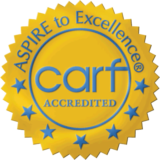Moral Reconation Intake
Begin your journey to addiction recovery with a moral reconation intake at MERIT. Moral reconation therapy (MRT) gives you tools to better manage difficult decisions you may face during addiction and recovery. Our trained and certified moral reconation treatment services are one of many drug treatment programs we offer to help you achieve a successful recovery at our outpatient rehab center.
What is Moral Reconation Therapy?
MRT is a cognitive behavioral treatment system developed in the 80s by Drs. Greg Little and Ken Robinson to improve outcomes in addiction recovery. We recommend this drug addiction treatment protocol for those with anger management issues, individuals who’ve suffered emotional trauma, and criminal substance abusers to decrease the likelihood of re-arrest.
Moral reconation therapy focuses on building moral reasoning skills to aid in addiction recovery. It does not imply that those prescribed this treatment lack moral reasoning – MRT addresses decisions and behaviors surrounding acts committed during substance misuse. Moral reconation treatment aims to change faulty thought processes and improve decision-making skills. It’s a preferred alternative for adults and adolescents resistant to traditional therapy.
Benefits of Moral Reconation Therapy
Moral reconation therapy helps participants:
Face negative behaviors, attitudes, and beliefs
Develop and reinforce positive attitudes and behaviors
Consider the values/roles of current relationships and how they impact treatment
Decrease self-indulgent tendencies
Increase frustration tolerance
Improve moral reasoning
Establish a healthy, positive, realistic self-image
What to Expect During Moral Reconation Intake and Treatment
Moral reconation therapy is considered a 12-step program but is not the same as AA or similar addiction treatment services. It features group discussion sessions surrounding ethical dilemmas that expose challenges to existing thought processes and written exercises to evaluate relationships and the program’s impact on personal progress. Participants may perform community service acts later in treatment. Feedback given throughout the process ensures realistic goal setting and diligence in completing treatment activities. Encouragement surrounding achievements helps attendees build a realistic self-image and positive relationships.
15 Steps of Moral Reconation Therapy
MRT rehab therapy brings substance users through a 15-step journey, commonly referred to as the “Freedom Ladder,” taking an average of 3-6 months to complete:
Steps 1 and 2 – Honesty and trust
In this stage, dubbed “Disloyalty,” substance users may lie, steal, and exploit others to continue using.
Step 3 – Acceptance
In this stage, “Opposition,” individuals may still display disloyal characteristics and blame others for their behavior but make steps towards honesty.
Step 4 – Awareness
In this stage, “Uncertainty,” participants begin to question behavior but may not commit to change.
Steps 5 and 6 – Healing damaged relationships and helping others
In this stage, “Injury,” people may still struggle to meet obligations but identify pain caused to others, seeking to make amends and offer help.
Steps 7 and 8 – Defining short/long-term goals and identity
In this stage, “Non-Existence,” people struggle with self-identification and purpose, but have more meaningful relationships.
Steps 9 and 10 – Commitment to achieving long-term goals and maintaining positive relationships
In this stage, “Danger,” commitment to goals supports identity formation.
Step 11 – Keeping moral commitments
In this stage, “Emergency,” participants feel the urgency to reach goals and fulfill relationship and societal responsibilities, putting other’s needs over their own.
Step 12 – Choosing moral goals
In this stage of addiction recovery, “Normal,” people make decisions based on what’s best for others and themselves. Relationships become based on honesty and trust. Participants may feel driven to support social causes.
Steps 13-16 – Evaluating the relationship between one’s inner self and personality
In this final stage, “Grace,” people dedicate their lives to others without looking for payback, seeing others’ needs as an extension of themselves.
Are You Ready to Take Steps to a Brighter Tomorrow?
Contact MERIT at 877-789-3344 to schedule a moral reconation intake consultation at our Ellensburg, Kennewick, Pasco, Sunnyside, Toppenish, Wapato, or Yakima rehabilitation center today.
